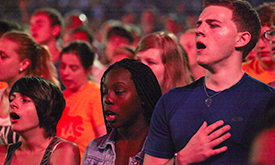Have you stopped to appreciate how much Christmas music there is? Music, both sacred and secular, is an integral part of the Christmas holidays. It seems that everybody knows Christmas songs, especially the standards like “Joy to the World,” “Silent Night” and “Jingle Bell Rock.” I’m noticing the music of the Christmas season more than usual this year because of some thoughts I’ve had lately about music, and music in youth ministry.
In Lutheran grade school, in the 5th to 8th grades, we were required to lead morning devotions. Our teachers required us to include a hymn. About once a week (perhaps a bit of an exaggeration) we’d sing “I’m but a stranger here, heaven is my home.” I don’t know if we included is so often because of our profound belief in heaven or because it was the last hymn in The Lutheran Hymnal (TLD 660, now LSB 748) and easy to find. And it subtly taught us that singing and music were a part of what we did as God’s people.
I have always believed that music should be a significant part of youth ministry. Even for kids whose voices were changing, there was a place for singing. Unfortunately perhaps, for me, that included my own 8th grade confirmation class singing as a choir “Let Us Ever Walk With Jesus” in front of the whole congregation on confirmation Sunday.
Going back to when I was in high school and college, it seems like everybody, especially youth ministry people, could play the guitar or piano or were willing to sing. Poets were writing new music – usually songs with verses that offered solid teaching with fun, singable melodies, often enhanced by drums and other rhythm instruments. Writers like Kurt Kaiser (Pass it On), John Ylvisaker (Morning Cry), Norman Habel, Herb Brokering (Earth and All Stars), Keith Green, Michael W. Smith (Great Is the Lord), Robin Mann (Father Welcomes) and others were writing strong music. And we included it whenever we got together.
Singing went with youth ministry. Meetings started with a song. Worship and devotions always included music. Gather around a campfire or go on retreat and you sing a few songs. Where two or three teens were gathered together, sing a song!
It seems like that we don’t sing as much as we once did. These days we might actually hear as much music with our downloads, music streaming and headphones but it seems like (and some research verifies) that there are fewer and fewer guitarists and pianos and probably less singing . . . except maybe at Christmastime.
If my observations are generally true and we are singing less, I think it’s really a shame. Music can be a great teacher. Music gives substance to your faith expression. Music is a great way to connect to the teaching, history and traditions of the church. And, besides that, music is a great way to celebrate and bring joy. Music connects you to heavenly praise as we join the angels in worshipping the Lamb.
I believe music can play a substantial role in youth ministry. Encourage your musicians. Express your appreciation for their talents. Learn to play the guitar yourself. Develop a list of favorite songs and hymns (Check out “Singing Saints Songbook” from Concordia Publishing House). Make sure music is a part of your program, Bible studies, servant events, and confirmation process. Explore the standard hymns of the church but also explore the new music of new poets and song writers.
In an inclusive list, St. Paul writes in Ephesians 5:19 and Colossians 3:16, “Speak to one another with psalms, hymns and spiritual songs. Sing and make music in your heart to the Lord.” Grab a hymnal, or project some lyrics. Turn your voice up. Encourage “joyful noise.” It’s not so much about singing on key. It is about praising the Lord . . . and doing it with music.
Music is a tremendous blessing and tool, a great gift from God. Or to quote an old Christmas song,
“NOW SING WE! NOW REJOICE!”

